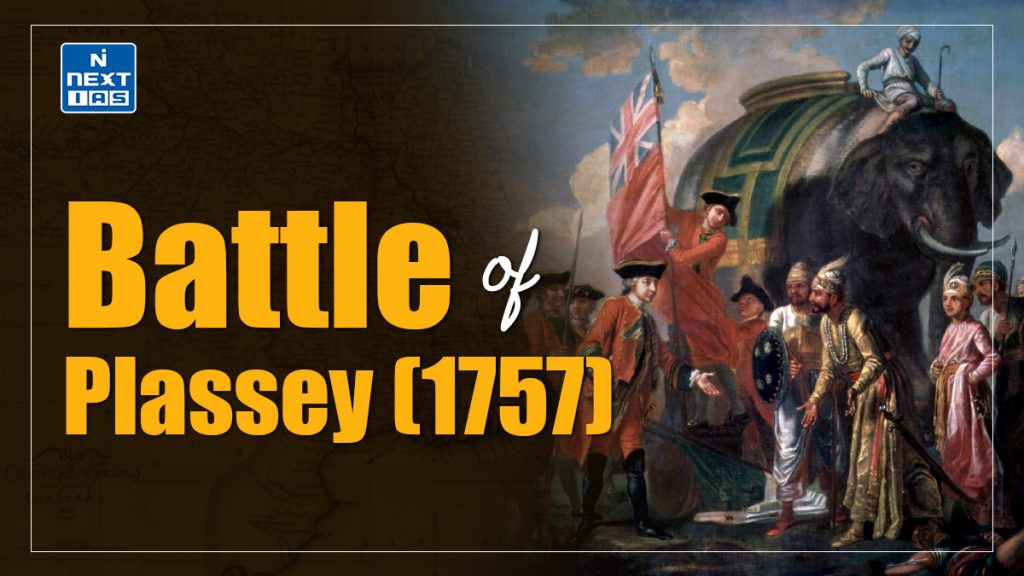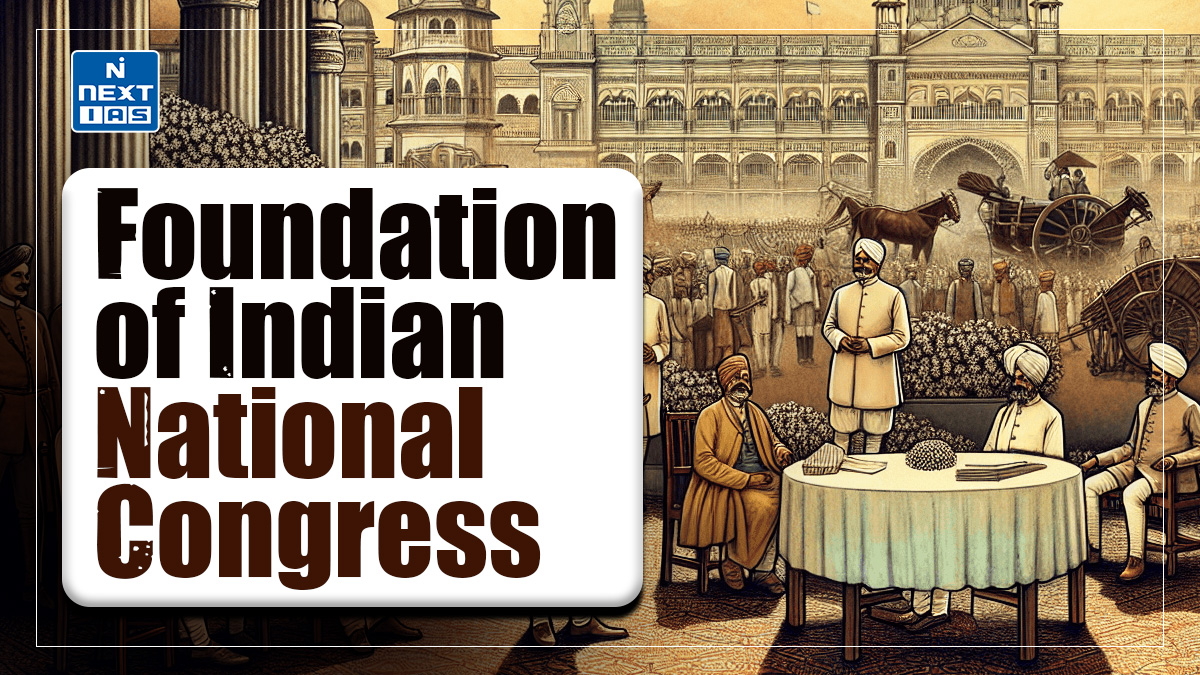
The Battle of Plassey fought on June 23, 1757, marked a pivotal turning point in Indian history, setting the stage for British colonial rule. Sparked by political and economic tensions between Siraj-ud-Daula, the Nawab of Bengal, and the British East India Company, this conflict was not a traditional battle but a carefully orchestrated event involving intrigue and betrayal. This article aims to study in detail the causes, events, and aftermath of the Battle of Plassey and its profound significance in shaping British colonial rule in India.
About Battle of Plassey
- As a corollary to Siraj-ud-daula’s occupation of Calcutta, the British authorities in Madras sent a contingent under the command of Lord Robert Clive to recapture Calcutta.
- It was achieved without any effort, as Manik Chand, the Nawab’s officer in charge of Calcutta, was bribed and surrendered the city without any resistance.
- The Nawab made peace with Lord Clive by the Treaty of Alinagar with the following terms:
- Restoration of former trade privileges to the Company.
- Granting permission to the British to fortify Calcutta.
- Promise of compensation to the British for losses suffered.
- However, this did not please the English, who had gone on the offensive. Robert Clive began to conspire with Nawab’s officers.
Conspiracy in Battle of Plassey
- Manik Chand, the Nawab’s officer in charge of Calcutta, had been bribed to surrender Calcutta to the English.
- Robert Clive also took advantage of the disaffection among the Nawab’s officials.
- He made a secret alliance with Mir Jafar (The Commander-in-Chief of the Nawab’s army), Rai Durlabh, Jagath Seth (an influential banker of Bengal) and Omichand (a rich merchant) to replace Siraj-ud-daula with Mir Jafar as the Nawab of the Bengal.
Causes of Battle of Plassey
- Misuse of Dastaks: The company officials’ misuse of trade privileges adversely affected the Nawab’s finances.
- Attack on Sovereignty: The Company’s fortification of Calcutta without the Nawab’s permission and its refusal to demolish it at the Nawab’s request were interpreted as an attack on the Nawab’s sovereignty.
- Asylum to Fugitives: The company further gave asylum to a political fugitive, Krishna Das, son of Raj Ballabh, who had fled with immense treasures against the Nawab’s will.
- Black Hole Tragedy: Black hole tragedy was also an important reason for the conflict.
- English Offensive: Although the Treaty of Alinagar restored the Company’s trade privileges, among other things, it was now on the offensive and wanted to replace the Nawab with Mir Jafar.
Read our detailed article on Black Hole Tragedy.
Events of Battle of Plassey
- The Nawab’s army, led by him, and the English army, led by Lord Clive, met on the fields of Plassey on 23 June 1757.
- The battle between the two forces was a battle only in name. While the English lost only 29 men, the Nawab lost nearly 500.
- A major part of the Nawab’s army,led by Mir Jafar and Rai Durlabh, did not take part in the fighting.
- Siraj-ud-daula was captured and murdered by order of Mir Jafar’s son, Miran.
Aftermath of Battle of Plassey
- After the battle, Mir Jafar was made the new Nawab of Bengal as per Lord Clive’s plan.
- The Company was granted the undisputed free trade rights in Bengal, Bihar and Odisha.
- Mir Jafar rewarded the English’s services by granting Zamindari 24 Parganas, besides a personal present of 234,000 pounds to Clive, and giving 50 lakh rupees to the army and naval officers.
- The company was compensated for the losses suffered at Siraj-ud-daulah’s capture of Calcutta.
- All French settlements in Bengal were surrendered to the English. It was also understood that British merchants and officials would no longer be asked to pay duties on their private trade.
Significance of Battle of Plassey
Sir Jadunath Sarkar mentions the significance of Plassey by saying, “On 23rd June 1757, the medieval period of India ended and the modern period started”. For the British, this Battle of Plassey was influential in the following ways:
- Political Importance: It made the British masters of Bengal. The conquest of Bengal made it possible for the British to attempt the conquest of India.
- Economic Importance: Bengal’s revenues enabled the company to organise a strong army and meet the cost of conquering the rest of the country.
- They also helped it win the third Anglo-French war. Bengal’s control of revenue and monopoly over its trade strengthened the company’s financial position.
- It helped the Company’s servants amass untold wealth. Indian Industries declined rapidly after this Battle.
- Military Importance: Bengal also benefited the English navy.
- As it was situated near the ocean, it was very easy for them to move their troops, and its vast resources helped them conquer Marathas, French, Sikhs, etc.
- Moral Importance: The events and results of the battle showed that the British did not value moral values.
- They relied on conspiracy, greed, bribery, dishonesty, and immoral acts to achieve their plans.
- The English kept morality aside and started the economic exploitation of Bengal.
- Cultural Importance: After this battle began, a process culminated in the Anglicisation of India and its society.
- The British introduced several changes in the country’s administrative, revenue, educational, and judicial structures.
- It also increased India’s association with the modern ideas that had been gaining popularity in Europe.
Conclusion
The Battle of Plassey’s consequences extended far beyond the immediate British control of Bengal, marking the beginning of the colonial expansion that would eventually encompass the whole of India. The political and economic gains secured through this victory gave the British East India Company a strong financial and military foundation, allowing it to grow its influence and power. The battle also had lasting cultural and administrative impacts as British systems and practices gradually replaced indigenous ones. Ultimately, Plassey not only transformed the history of Bengal but also set India on a path of colonial dominance that reshaped the nation’s future.
Frequently Asked Questions (FAQs)
When was the Battle of Plassey fought?
The Battle of Plassey was fought on 23rd June 1757.
Who won the Battle of Plassey?
The British East India Company, led by Robert Clive, won the Battle of Plassey against the forces of Nawab Siraj-ud-Daulah of Bengal.
Why did the Battle of Plassey become famous?
The Battle of Plassey became famous because it began British political control in India. The victory gave the British East India Company significant influence over Bengal, ultimately leading to the establishment of British colonial rule across India.
What is the Battle of Plassey?
The Battle of Plassey was a decisive conflict fought between the British East India Company and the Nawab of Bengal, Siraj-ud-Daulah, in 1757. It marked a turning point in Indian history, allowing the British to expand their influence and eventually establish control over large parts of India.





